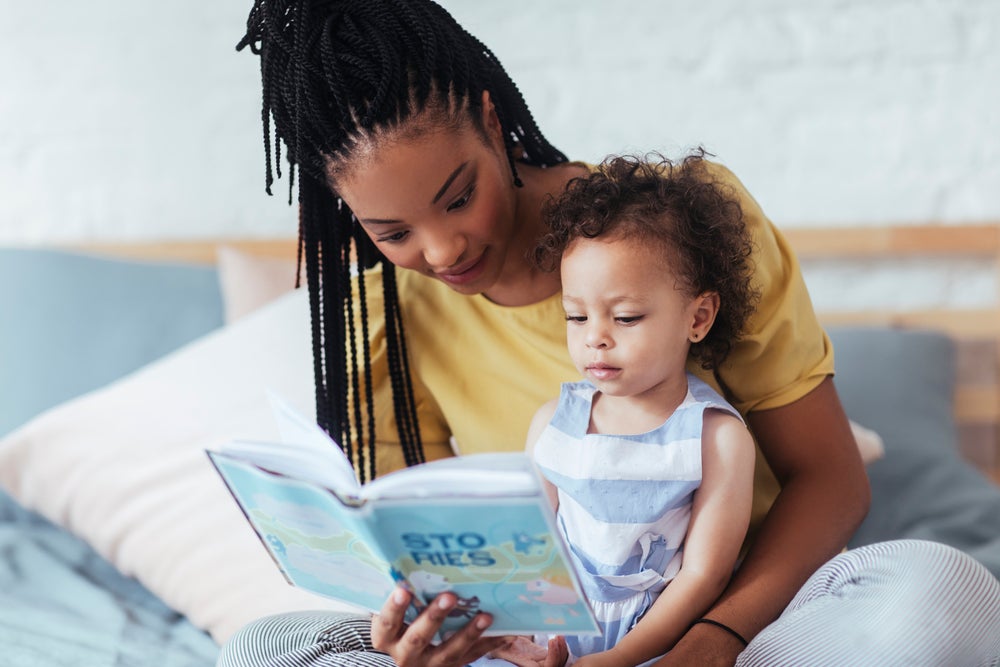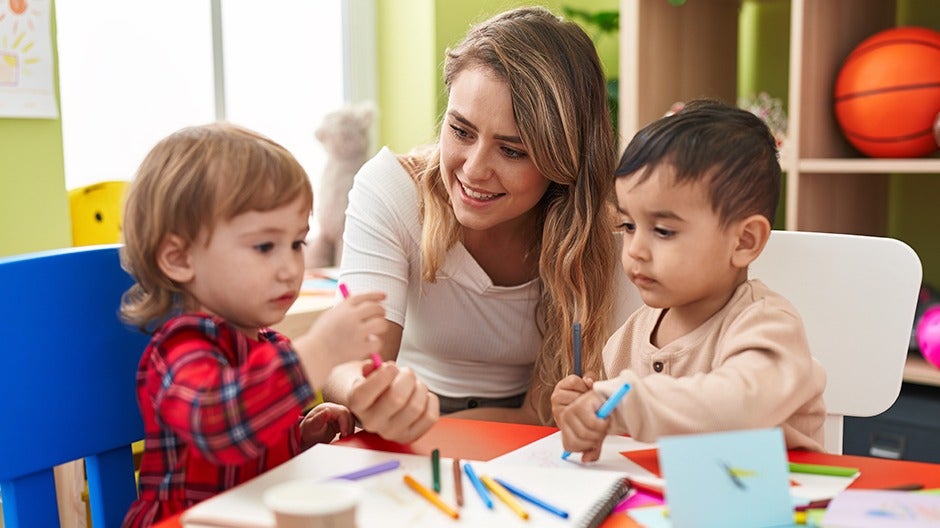Kids don’t just go from chewing on books as babies to reading all at once. Between the two comes the stage of emergent literacy—an essential part of building Core Skills, one of the 5 C’s at the heart of the Begin Approach to helping kids thrive in school and life.
Strong Core Skills (especially language and literacy) help kids throughout their time in school, so developing them early is important. Want to know more about what emergent literacy is and how you can help kids develop it?
We’ve got you covered.
The Short Cut
- Emergent literacy occurs before kids start reading, while they’re building important pre-reading skills
- During emergent literacy, kids start showing interest in books, begin to comprehend stories, recognize letters, and make marks to represent actions and objects
- Emergent literacy can be fun! Parents can encourage it by reading aloud, letting kids pretend to write, having conversations with kids, and more
What Is Emergent Literacy?
Here’s our definition of emergent literacy: the stage during which children learn the crucial skills that lead to writing and reading. This typically lasts from birth (or even before, as babies listen to their parents’ voices in the womb) until a child learns to read around age 6 to age 7.
Like other communication skills, literacy develops in stages, building on early foundations and becoming more advanced as kids get older.
The skills kids develop during the emergent literacy phase prepare them to be strong readers and writers when their brains are ready.
Components of Emergent Literacy
Emergent literacy consists of several components. As kids move closer to reading, they’ll start:
- Taking an interest in and enjoying books, including handling books and relating them to their stories or information
- Developing print awareness skills, like how to handle a book and reading from left to right
- Recognizing pictures and some symbols, signs, or words
- Telling and listening to stories
- Paying attention to, repeating, and using some rhymes, phrases, or refrains from stories or songs
- Making marks and using them to represent objects or actions
- Understanding that words are made up of letters, and recognizing letters when they see them
- Comprehending meaning from pictures and stories
Why Is Emergent Literacy Important?
As kids get better at each of the components of emergent literacy, they create a strong toolkit they’ll need to read. Like other complex skills, reading and writing require some preliminary learning.
For example, you probably didn’t wake up one day knowing how to make pancakes (although if you did, we would love to hear your story!). Instead, you had to learn what pancakes looked like (so you’d know if you’d done it correctly), how to mix ingredients, how to turn the stove on—even which end of the spoon to hold!
These preliminary steps make learning the final complex task much easier. It’s hard to learn to cook pancakes if no one has ever shown you how to hold a spoon.
Emergent literacy prepares your child’s brain with the skills they’ll need to read. And while this may sound complicated, it doesn’t have to be! Many emergent literacy skills develop naturally (and are fun to encourage as a parent).
5 Ways to Support Emergent Literacy Skills
When your child points at something and you follow their direction, or when you call their attention to noises, objects, or people in their surroundings by speaking to them, you’re helping them develop emergent literacy skills.
Here are some other fun and easy ways you can stimulate your child’s emergent literacy skills at home.
1. Read Aloud
Reading aloud is the most effective way for kids to learn to love books and the power of stories. Loving to read begins with loving to listen to stories!
Read-aloud sessions with kids can substantially improve many of the skills they need on their reading journey. For emergent readers, there are few things more wonderful (or effective) than sitting down with a parent or caregiver and uncovering the worlds that live between the covers of a book.
Reading aloud to kids also helps strengthen their imaginations and build their Curiosity (another one of the 5 C’s). While listening to you recount the wonderful world inside of a story, your child’s mind can run through images, scenarios, and colorful possibilities that lie beyond the page.
2. Let Kids Lead
As kids grow, their desire to be independent grows too. Following your child’s interests and letting them assert their independence can keep them engaged during emergent literacy.
For example, instead of you turning the pages during your reading time together, allow your child to dictate when the pages should be turned. This may take some getting used to for them as they learn the pace of reading aloud in conjunction with the words they see printed.
You can also let them experiment with narrating. Even though your child can’t read yet, allowing them to tell the story shows them that they will read one day not far away. (Plus the stories they make up can be pretty cute!)
Letting your child pick out the book you’ll read together is another great way to engage their independence. It gives them something to look forward to while reading with you and gives you insight into their interests.
And if you find your child keeps reaching for the same book multiple times, don’t worry—rereading is great for learning!
3. Take Your Time
Slowing down while speaking to your child or reading together can help them with emergent literacy.
Especially when we’re busy or our kids aren’t talking back much, it’s easy to start moving through tasks without communicating. But talking a lot to your child, especially in their very young years, can help them gain the skills they’ll need to read, speak, and write.
And we know it can be tempting to rush through a book (especially one you’ve read a hundred times), but slowing down and reading with expression can help kids learn too.
Asking questions is another great way to get kids to engage with a story. Consider these:
- Does your child recognize every animal on a page?
- Do they know what color this character’s hair is or whose hair it resembles in your family?
- Do they know what sound a truck makes?
- When you say the word “surprise,” does your child react in a way that conveys understanding (throwing their hands up in exclamation or even clapping)?
Addressing these questions can help your child slow down and take in all the details in a story, paving the way for reading comprehension.
4. Build on Their Words
If you like our last emergent literacy strategy, this one pairs perfectly with it!
As your child expands their vocabulary and begins utilizing it more often, you have the chance to elaborate on the things they point out to you. For example, if you’re walking together and they see a dog, they may point at it and say, “Puppy!”
Following up their observation with a cheer is great. Following up with more questions is even better! After affirming they saw the right thing (or correcting them if they mistakenly called it a kitty, for example), you can ask them about details and descriptions.
You could say, “Does this puppy have long ears? Yes, he does! Feel how soft his ears are. Isn’t his fur shiny, brown, and so soft? What a cute puppy.”
Injecting these details and descriptions into your conversations helps your child immensely.
By expanding on the image they identified, you’re directly contributing to their understanding of the scene in front of them. The next time they see a puppy in a park, they may take your lead and say, “Look! A puppy with long ears!” (Or, in toddler-speak, “Look! A puppy have long ears!”)
This progress can then translate into deeper literacy when they engage with a scene in a book the same way.
5. Let Your Child Write
Emergent literacy incorporates writing as well as reading. At first this may seem a little ambitious (how can your child write if they don’t know how to read yet?), but it’s not too soon to start practicing.
While your child may not be able to correctly write out words for a few years, trying to write helps them develop skills they’ll eventually need. It also prepares them for what writing is really like and shows them that they have the power to put words on paper.
There are many stages of learning how to write, and scribbling is the first step!
Asking for your child’s help with writing out short tasks is a great way to boost their confidence and their excitement about learning to write. Good options for tasks include grocery lists, birthday cards, get-well-soon cards, thank-you notes, or notes for their siblings and family.
At this stage, they may not be truly helping so much as mimicking you (writing their own “grocery list” while you do the family’s, for example), but it’s still great practice. And anything that keeps them excited and engaged (even if it’s trying to add “a million cookies” to the grocery list) is a great vehicle for motivating them to develop their writing skills!
Emergent Literacy with Begin
Emergent literacy is the start of your child’s reading and writing journey, from learning to turn pages to reading books confidently. Reading is one of the most important Core Skills kids can master, and we built our award-winning HOMER app to help kids discover it through the power of play.
HOMER’s reading games are customized for your child’s age and level, meeting kids where they are as young as age 2. From letter recognition and how books work to phonics, sight words, and independent reading, it’s got your family covered. Just 15 minutes a day can raise early reading scores by 74%!
And to help your child thrive beyond reading, our Early Learner Program brings together a comprehensive bundle of our products to give your child their best start across the 5 C’s.
We hope our emergent literacy tips were helpful, and that you can enjoy watching your child’s understanding flourish. And remember, if you need a little help, we’re here for you!













